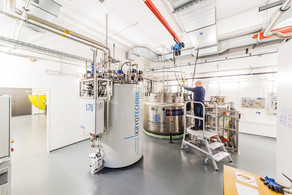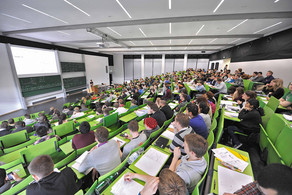Thesis defense of Fabian Eickhoff
- Defense
In this thesis, the numerical renormalization group (NRG) is used to solve several quantum impurity systems, which primarily differ in the number of correlated impurities under consideration. A combination of the NRG and the density functional theory (DFT) is applied to calculate the spectral functions of a metal-molecule-complex, composed of a single naphthalene-tetracarboxylic-acid-dianhydride (NTCDA) molecule adsorbed on a silver Ag(111) surface, and explains the inelastic contributions observed by experimental scanning tunneling spectroscopy. The theoretical modulations as well as the numerical simulations are generalized in order to study multi impurity problems and a detailed analysis of the well established two-impurity Anderson model enables the derivation of an effective low-energy model. This approach is generalized to models with an arbitrary number of impurities and used to study different phases and phasetransitions in multi-impurity systems. Moreover, the question to what extent the physical effects and mechanisms of a single magnetic impuritie in a metal can be adopted in a periodic extension of the model is discussed. These models are frequently used to describe the basic properies of certain materials, the Heavy Fermions.









